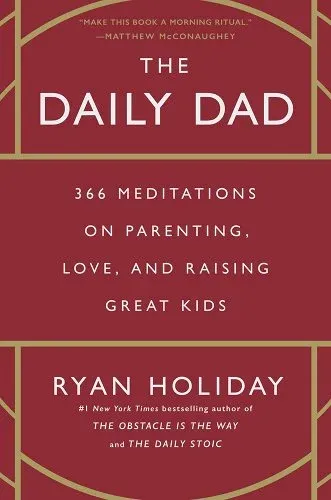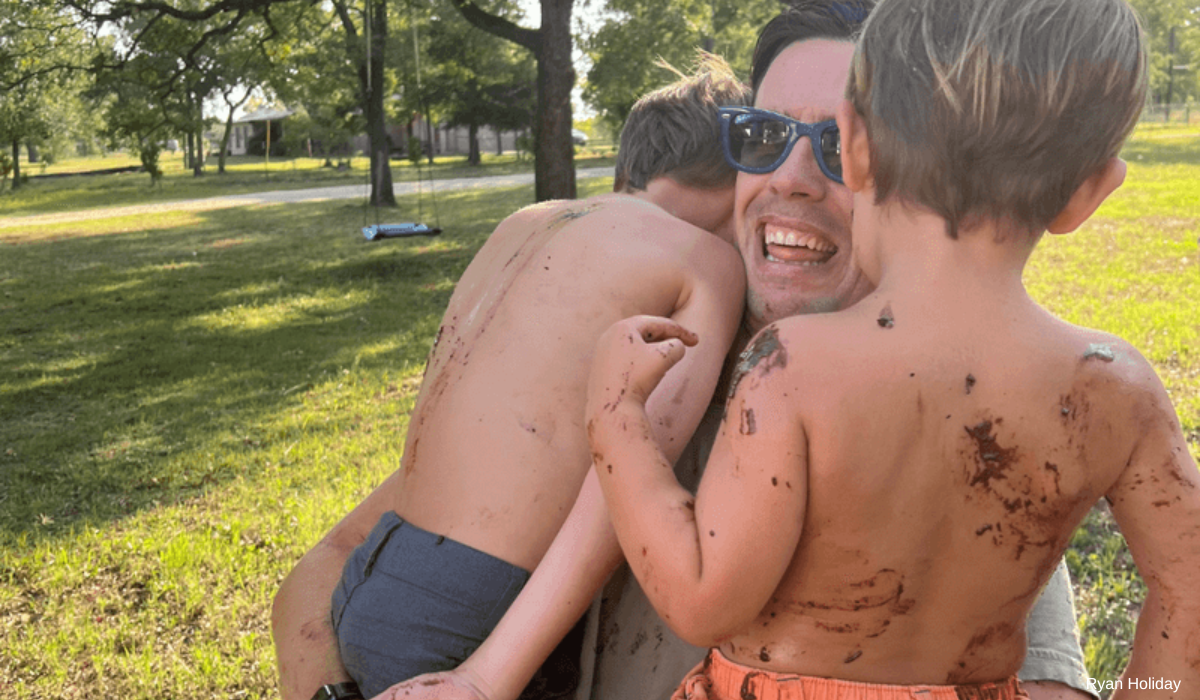Best-Selling Author of 'The Daily Stoic', Ryan Holiday, on How to Be the Most Inspiring Role Model to Your Kids
Ryan Holiday is forever in pursuit of self-mastery, serenity, and wisdom. A visionary thinker who weaves the learnings of ancient philosophy into his life and work, Holiday is the author of many best-selling books, including The Daily Stoic, his global hit that shows how history’s most beloved figures embraced the knowledge of the ancient Stoics.
Holiday's latest book is the subject of our conversation: It’s called The Daily Dad: 366 Meditations of Parenting, Love, and Raising Great Kids, and it’s the result of his passion for holding the role of parenting to the highest accord. “Can you imagine a world where more parents were more?” he writes.
In The Sunday Paper’s chat with Holiday, we talk about the difference between simply having kids and being a present, loving parent. Holiday guides us through what good parenting means to him and how all of us, whether we’re parents to toddlers or adults (or not even parents), can lean into wisdom to be role models to those we love and also to the world.
A CONVERSATION WITH RYAN HOLIDAY
One thing that's evident in your works, from The Daily Stoic to Stillness Is the Key, is how you enjoy learning about that topic. What called you to write this book, The Daily Dad?
When I wrote The Daily Stoic, I got so much out of it. I learned so much. And the daily practice of it has made me a better human being. Thinking about these timeless lessons from these historical figures who are kind, generous, smarter, and more accomplished is a meditation for me. So when we had kids, it seemed natural and self-fulfilling that doing the same thing for parenthood would be extremely beneficial—for me and, hopefully, other people as a byproduct. So I love doing it, and part of the reason I love doing it is that I get so much out of it.
You write, "Procreating is biological. Parenting is psychological." What do you mean by this?
Most people are able to biologically have children. There's also the legal status if one adopts or marries someone with kids. But the decision to become a parent, making this an essential part of who you are, what you do, and how you shape your decisions, is not something that everyone gets right. There's a difference between having kids and embracing being a parent.
It's a deeper commitment that you make. It's a form of identity and values and craft and love and passion. You can sort of coast through it, especially for men, because there's often a spouse or partner willing to pick up that slack. But the decision to be like, This is my thing now is the most important decision a man or woman can make.
What does being an active, loving, role model parent today look like for you?
I heard this great expression, which I have in the book, that love is spelled T-I-M-E. It's about time, first and foremost. The other thing I've been joking about is that presence is the key to parenting. You have to give them lots and lots of presence—but not the kind of presents that come wrapped under the tree, but the time presence. Can you actually be there and be connected and not think about all the other things going on in the world or your life?
Your book sparks how different the world would be if some people had kinder, more present parents. It begs the argument that being a good parent impacts humanity.
There's a line where someone asked Kissinger what kind of man Nixon could have been if someone had loved him. People are very, very ambitious in their careers. They want to leave this huge legacy. They want to change people's lives and have this impact. But then they say, 'Sorry, I can't play right now. I'm busy.' There are people in their house who are, by definition, an opportunity for multi-generational impact, yet we just give that up. We don't look at that. Think about your grandparents' conversations that have changed how your parents treated you and how you treat your children. Right there, you have the definition of multi-generational impact from one conversation.
The book is organized by daily pieces of advice, with each month dedicated to a theme. You explore the theme of character in May. Why is building character a critical part of being a great parent?
Going back to the Greeks, there is the idea that character is fate. You want your kid to succeed in the world, and you want them to be a good person. But then we end up focusing on all these other things like we want them to do well in school, we want them to go to college, we want them to pick the right career path. They may be correlated. But character is the ultimate tool. A person with good values, a good head on their shoulders, and a good heart will be okay. So I wanted to spend a month focusing on how you teach values and build character, which we know is about leading by example.
Parenting is very hard—whether you're raising a 2-year-old or you have a child in their 40s. What do you say to the parent who may feel overwhelmed?
Parenting is hard—but it's always been hard. I take a lot of faith and comfort in the idea that I descend from people who went through really hard stuff. It was hard for your parents and their parents. It was hard for your relatives 10,000 years ago—and they got through it. We all come from salt-of-the-earth people who were just as overwhelmed and outmatched, and they figured it out. And you have those people's chi in their blood running through you now.
You have two young sons. What's been a marker of successful parenting for you?
Last week, we had to put down our dog that we had for 16 years. It was super rough. This dog has been here for the entirety of my six-year-old's life, so he had a super hard time with it. But he was open about having a hard time with it. He was willing to be vulnerable and sad about it in front of us. My wife and I both took that as a huge sign of success.
If you think of a 50-year-old man who's not in touch with his emotions and stuffs his feelings down, you wonder, where did that happen? It's because when they were a little boy, and their dog died, their parents said, 'Get over it.' Or they made him feel ashamed. There's this image of stoicism as being emotionless. But I think it's someone good at processing those emotions. It's not being overwhelmed or ruled by them but knowing that we have them.

Ryan Holiday is a writer and media strategist. His books like The Obstacle Is the Way, Ego Is the Enemy, The Daily Stoic, and the #1 New York Times bestseller Stillness Is the Key appear in more than 40 languages and have sold more than 5 million copies. His latest book is The Daily Dad: 366 Meditations on Parenting, Love, and Raising Great Kids, which you can order here. Learn more at ryanholiday.net.
Question from the Editor: What does being a good parent mean to you? We'd love to know in the conversation below.
Please note that we may receive affiliate commissions from the sales of linked products.



